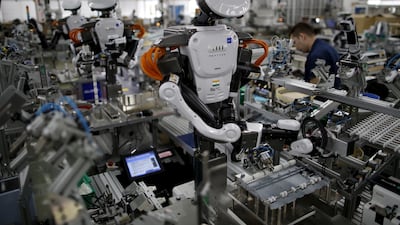Robots, artificial intelligence (AI) and machine learning are buzzwords that are often heard on the lips of tech chief executives these days. This, they claim is the future, where efficiency will reign supreme and economies will prosper with an array of new jobs in the technological field.
In reality, this revolution is likely to result in redundancies on an unprecedented scale. Much of today's workforce will be left jobless if they do not retrain or acquire new skills.
So would these chief executives be as enthusiastic about machines if it meant that one day their jobs would be replaced by a robot?
This question was posed to Kirill Tatarinov when he was still the chief executive of Citrix, one of the largest virtualisation companies in the world which invests heavily in virtualisation and AI. He responded by saying that if such a robot existed, “I would not hesitate in hiring it”.
What is telling is in a world where robots have developed enough to do the job of a chief executive, Mr Tatarinov still sees himself as the ultimate decision-maker. He is still doing the hiring, and the robot would still work for him, not replace him.Such is the disconnect between the people pushing these new technologies and those who will be affected by it.
It is easy to get caught up in a glistening vision of an automated world where robots will carry out menial tasks, help us with work and chores, all the while forgetting the 54-year-old labourer with a family and a mortgage who will be made redundant.
It is this demographic that is simply erased from such visions and the prospect of new jobs (which will require new skills) is not enough to absorb the legion of skilled workers who will be made redundant. Firms are unlikely to pick a skilled worker over a young graduate with the education and skills needed for new jobs like “3D-printing bio technician”.
–––––––––––––
Read more:
For every job lost to the robot revolution, an opportunity will arise
Mark Zuckerberg and Elon Musk's debate over artificial intelligence: will robots go rogue?
–––––––––––––
And it is not just skilled workers who are most at risk. Willrobotstakemyjob.com is a website that gauges the probability of losing your job to a robot.
An insurance sales agent is 92 per cent at risk of being replaced by a robot whereas a chief executive is only 1.5 per cent at risk.
Many will state that we've been through this before with the Industrial Revolution, and that to move forward as a society, we need to accept the consequences.
But the internet or digital revolution is unlike the Industrial one. It is moving at a faster pace, it affects more lives on a global scale and it threatens to replace humans from doing all human jobs in just over a century, according to a recent study from Oxford University.
A rise in unemployment can lead to protests and revolutions and a jobless population will reshape society and politics as we know it. This is the dilemma that governments and industries around the world will have to navigate to ensure stability and an easy transition to the future.

